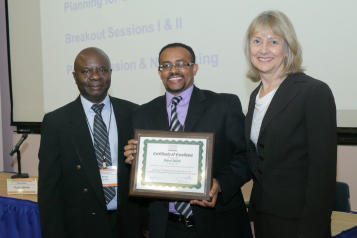Program Spotlight: 2015 Scientific Poster Winners at CRCHD Professional Development Workshop
, by CRCHD staff
As part of its 2015 Professional Development Workshop, CRCHD invited CURE scholars, trainees, and investigators to participate in a competitive, interactive poster session - providing participants with an opportunity to present their research findings and plans for future research. Poster session participants used the opportunity to highlight their research, and also, to network with their peers and CRCHD staff, including the poster judges.
Third place winner, Dr. Whitney Robinson said, “One of the best parts of the poster competition was talking to other presenters about their on-going work. In addition, the poster judges and other attendees made insightful observations reinforcing the next steps of my research.”
A myriad of cancer health disparities-related topics were covered, representing basic science, community-based participatory research, and clinical research. All posters were judged by a CRCHD Poster Review and Judging Committee.
Winners of the 2015 CRCHD Professional Development Workshop Poster Session are presented below:
First Place: Bisrat Debeb, Ph.D., The University of Texas, MD Anderson Cancer Center, CURE Diversity Research Supplement Awardee
Title: MicroRNA 141: A Novel Regulator of Brain Metastasis from Breast Cancer
Findings: Brain metastasis poses a major treatment challenge and remains an unmet clinical need. The purpose of this study was to identify molecular mediators of brain metastasis from breast cancer. GFP-labeled cells were injected into mice and metastatic colonization to the brain and lung was evaluated by fluorescent stereomicroscope and histology 8-weeks after injection. This research generated novel brain metastasis models that can be used to develop new treatments. The research team also demonstrated miR-141 as a key regulator of brain metastasis and provided clinical evidence supporting the prognostic relevance of miR-141 in patients with brain metastasis. This work will lead to the development of new targets for the prevention and treatment of brain metastasis, improving patient survival, in addition to advancing this area of cancer research. Dr. Debeb’s next steps include further identification of novel drivers of brain metastasis, further research to understand the mechanistic insights into metastatic dissemination of breast cancer cells to the brain, and therapeutic evaluation of the efficacy of anti-miR-141 oligonucleotides to prevent or treat brain metastasis from breast cancer.
Second Place: Wilfred Ngwa, Ph.D., Dana Farber Cancer Institute, Brigham and Women’s Hospital and Harvard Medical School, CURE K01 Awardee
Title: Nanoparticle Drones: New Technology to Kill Deadly Cancer Cells with Minimal Collateral Damage
Findings: The objective of this research was to develop next generation radiotherapy biomaterials for the treatment of metastasis. Dr. Ngwa and his team developed new Biomaterials for Radiotherapy Application as Nanoparticle Drones (BRAND) by coating/upgrading current inert radiotherapy biomaterials with a biodegradable/biocompatible polymer loaded with non-toxic fluorescent gold nanoparticles (GNP) and immunoadjuvants. The BRAND was implanted in mouse tumor models and the release of the GNP from the BRAND was measured. The GNP substantially enhanced local killing of tumor cells by more than two-fold during radiotherapy. The results demonstrate potential for employing nanoparticles released from the new BRAND to enhance radiotherapy for prostate/lung cancer patients. Dr. Ngwa concluded that these results justify further investigations to optimize the design of the nanoparticle drone technology to radiotherapy schedules for enhancing tumor cell kill with minimal collateral damage. The next steps in the research are to optimize and investigate release of immunoadjuvants from the new BRAND to potentiate the abscopal effect for both local and metastatic tumor cell kill.
Third Place: Whitney Robinson, Ph.D., University of North Carolina at Chapel Hill, CURE K01 Awardee
Title: Early Gynecologic Surgery and Breast Cancer Risk Among Black and White Women in the U.S. South.
Findings: Dr. Robinson used data from the Carolina Breast Cancer Study, a population-based case-control study of breast cancer diagnosed between 1993-2001 among North Carolina women, to examine the associations between gynecologic surgery before age 45 and breast cancer diagnosis. She found that black women in North Carolina had experienced higher rates of ovary removal as compared to white women and that this surgery was associated with lower risk of breast cancers. She concluded that among older black Southern women, historically high rates of early surgery and lower use of hormone replacement therapy after surgery may have depressed breast cancer rates. The implications for this research are that as hysterectomy rates decline, breast cancer incidence may increase among black women.
Resources:
- Learn more about CRCHD's CURE program.
- Learn more about CRCHD's Diversity Training branch.
- Director’s Corner: Professional Development and Mock Review Workshop Helps Early Stage Investigators Build Independent Careers in Scientific Research
- Program Spotlight: CURE Scholars Participate in Annual Mock Grant Review to Prepare for Independent Research Careers
